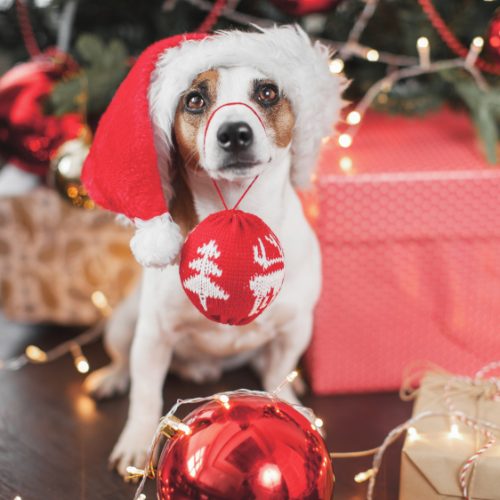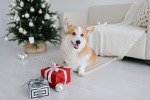
First things first: What should I do about feeding my pet from the dinner table at a holiday get-together this season?
Dr. Marks does not recommend feeding a dog or cat from the dinner table at any time of year, and this is especially the case during Thanksgiving dinner! There are many traditional holiday foods that can be harmful to your pet. A small amount of plain, unseasoned turkey can usually be a safe treat. However, if your turkey has been prepared in the traditional Thanksgiving manner, with a lot of fat, skin-on, and seasoned, Dr. Marks strongly encourages all pet owners to refrain from giving that turkey to your pooch or kitty. In addition to the fat and seasonings, small bones within a turkey can be very harmful to dogs, in some instances causing an obstruction and requiring surgery.
It is best to avoid giving your pet stuffing or dressing, a dish which typically contains onions and can sometimes include grapes or raisins, all of which are very harmful for dogs. Canned pumpkin is safe and also gives the added benefit of digestion, but pumpkin pie should not be given to your pet because of the sugar and spices included in its preparation. This principle also applies to plain sweet potato, which is safe by itself, but you should avoid sweet potato casseroles or pies, which can include whipped cream, nuts, or other digestive irritants. Many other desserts can also be harmful to your pet, including any with baking chocolate or xylitol (an artificial sweetener).
Ideally, Dr. Marks recommends keeping your dog or cat’s digestive system stable and healthy through the holiday season by sticking to their routine diet and avoiding table scraps. However, if a family member is adamant about having a furry family member share in the feast, small pieces of unseasoned turkey (if the dog or cat is not allergic) is typically safe—just make sure that no bones are in the pieces of turkey you give your pet. Canned, plain pumpkin and sweet potato is also typically safe; however, it does tend to turn bowel movements a more orange pigment. This is not an issue, just an item to note so as not to worry the next day when your pet potties!
How can I make my holiday decorations safe for my pets?
Real Christmas trees (pine trees) are mildly toxic for your pets. As described by Dr. Marks, the fir tree oils, if bit or licked, can cause drooling or even vomiting in your dog. Pine tree needles are also not digestible. These can be a major source of gastrointestinal irritation for your pet if swallowed. The needles can cause vomiting, obstruction in the intestinal tract, or even puncture through a loop of intestine.
In addition to pine needles, holly and mistletoe can be very toxic or harmful to dogs and cats during the holidays. However, Christmas cactus and house orchids are both nontoxic and safe to use for holiday decorations. Poinsettias, once thought of as a major holiday hazard, are actually much less toxic for your pet, rarely causing vomiting or diarrhea if ingested according to Dr. Marks!
No matter what kind of tree you have up in your home, there are several important precautions to remember with any artificial or real Christmas tree to be as safe as possible in the house. Dr. Marks recommends trying to place your tree in a corner to be the least obtrusive and obvious to pets. If your dog or cat is very interested and is trying to bite or climb the tree, you can utilize aluminum foil or a container with pebbles or coins in it that makes noise when the tree is touched to act as a deterrent. It is also best to avoid decorating your tree with any tinsel, which can cause severe gastrointestinal obstruction if ingested. Also, try to avoid using any edible tree decorations (like strings of popcorn), which can be very enticing for pets.
Regarding string lights for your tree and in other places around your home, all pet parents should be very cautious about their location and placement. Every holiday season, Dr. Marks and the Blum team see dogs and cats (usually youngsters) with either burns from chewing electrical cords or burnt off whiskers from getting near flames.
Dr. Marks encourages pet parents to remember these very helpful tips courtesy of Lowe’s:
“Make electrical cords less enticing. Cats in particular love to chew on dangling cords, which can result in shock or electrocution. Protect cords with cord covers, tinfoil tape or double-sided tape. You can also wipe down cords with something cats find distasteful, such as hot sauce, lavender oil or vinegar.
Choose flameless candles. Wagging tails and curious paws don’t mix with traditional candles. Opt instead for LED (light-emitting diode) flameless candles.
String Christmas tree lights on high branches only. Lights can become hot and burn your pet’s paws or mouth.”
What about the presents that I want to leave under my tree?
Dr. Marks shared that she typically does not recommend keeping gifts under the tree with unsupervised dogs or cats because they tend to be too tempting to stay intact until the holiday. Edible presents will be identified immediately by a curious dog or cat nose. In addition, most gifts are wrapped with ribbons, ties, or yarn, and these are very harmful when ingested, especially by cats. These trimmings can cause severe gastrointestinal irritation and obstruction, and they typically require surgical intervention. If one of your gifts contains a perfume, it can be very harmful if consumed because of the ethanol (alcohol) within the fragrance. Finally, it is very important to keep all batteries out of reach of your pets as these are very toxic if ingested.
I’m hosting a holiday party – what should I do to prepare my pet for it, and should I have special instructions for my human guests as well?
Dogs and cats do best with a routine and a safe, quiet space, according to Dr. Marks. Holidays can be overwhelming for humans, let alone for furry family with new triggers like strange faces, loud noises, and different feeding schedules. Pet parents should try to create a safe space, away from most guests. Also allow your dog or cat to have his or her toys, blankets, treats and other familiar items that bring comfort. It is best to keep your pet away from the dinner table during the meal and to instruct guests to not feed any table scraps. If your dog or cat has diagnosed anxiety or reactivity, talk to your veterinarian about situational anti-anxiety medication to give ahead of time to help your furry buddy cope better during events this holiday season!
Holidays can bring about both fun and frenzy for humans and their furry friends, but if you keep a few basic safety tips in mind, you can make sure that all of your family members have a safe and enjoyable holiday in the Windy City!
Thank you to Dr. Natalie Marks at Blum Animal Hospital for her insight into bringing home a new pet and introducing them to your furry family! We appreciate her hard work in making sure that every Chicago pet has the best life possible!
Blum Animal Hospital is located at 3219 N. Clark Street and has been caring for Chicago’s pets since 1952. They have been accredited by the American Animal Hospital Association (AAHA) since 1972. To learn more about Blum, their Fear Free certification and the calming techniques they use, check out their website!
Windy City Paws is a Chicago dog walker and petsitter committed to providing helpful information to Chicago dog owners through its blog.

